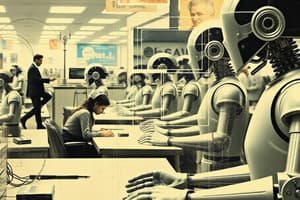Podcast
Questions and Answers
Match the following dynamics concepts with their definitions:
Match the following dynamics concepts with their definitions:
Force = Cause of motion Motion = Effect of force exertion Mass = Quantity of matter in an object Momentum = Product of mass and velocity
Match the following kinematics terms with their equations:
Match the following kinematics terms with their equations:
Position = $x = \int v dt = a_0 t^2 + v_0 t + x_0$ Velocity = $v = \frac{dx}{dt}$ Acceleration = $a = \frac{dv}{dt} = \frac{d^2x}{dt^2}$ Motion Under Uniform Acceleration = $a=a_0$, $v = a_0 t + v_0$, $x = a_0 t^2 + v_0 t + x_0$
Match the following mechanics laws with their descriptions:
Match the following mechanics laws with their descriptions:
Newton's First Law = A body at rest tends to stay at rest, and a body in motion tends to stay in motion, unless acted upon by some force. Newton's Second Law = The acceleration of an object is directly proportional to the net force acting on it and inversely proportional to its mass. Newton's Third Law = For every action, there is an equal and opposite reaction. Principle of Inertia = A property of matter by which it continues in its existing state of rest or uniform motion unless acted upon by an external force.
Match the following robotics simulation software with their primary usage:
Match the following robotics simulation software with their primary usage:
Match the following robotics control concepts with their descriptions:
Match the following robotics control concepts with their descriptions:
Flashcards are hidden until you start studying




